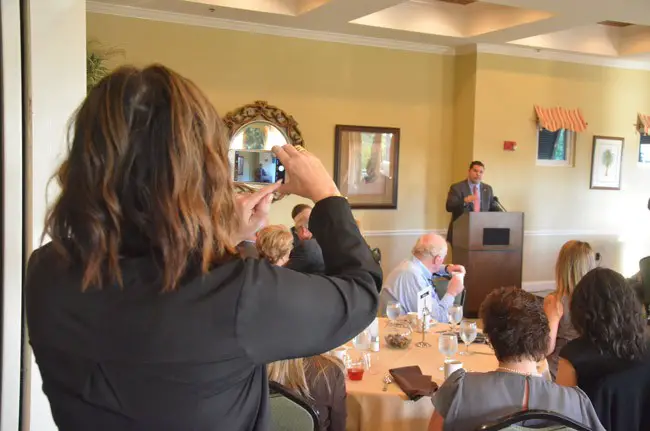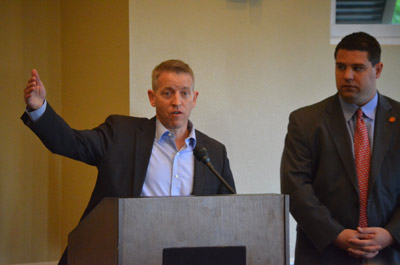
(© FlaglerLive)
Sen. Travis Hutson and Rep. Paul Renner were both elected to their current posts in a special election exactly a year ago.
“It’s been one heck of a year. Paul and I did not know what we were signing up for when we got elected,” Hutson said, “because subsequently there’s been four special sessions, so you probably haven’t seen us in the community because this is our first time really back since session ended about two or three weeks ago.”
The two legislators, whose districts include all of Flagler County, marked their one-year anniversary in an appearance this morning at a Flagler County Chamber of Commerce breakfast—dubbed Common Ground—attended by a representatives from all local governments except Bunnell, along with dozens of business people. They summed up their achievements while keeping any talk of opposition–or even of Gov. Scott, whose role and initiatives were marginalized in this session–silent. But you’d never know it was their first year in their respective chambers. They did not sound like rookies, but rather like seasoned senior legislators who happen to just be getting started.
They took credit for the money they earmarked for Flagler projects and that evaded Gov. Scott’s veto. There was quite a bit of it this time in the $82 billion budget, compared to previous years, including nearly half a million dollars to restore, at least for a year, the school district’s Adults with Disabilities program, $2 million for improvements to the Plantation Bay utility, $300,000 for the Malacompra basin drainage system, and $200,000 for a Flagler Beach wastewater system. In that regard, Hutson wasn’t exaggerating when he said: “We’ve done some really good things.”
But the money talk was brief. They both paid more attention to new laws and reforms, such as the “ultimate school-choice bill,” as Hutson described a measure that now allows any child to attend any school in the state, assuming space is available. “We’re not going to let the zip code determine what kind of education you’re going to get,” Hutson said, comparing the system to a voucher program. Choice has been in effect in Flagler County, which has several schools with some excess capacity, though cross-county choice had not as yet made
Hutson said he had a 50 percent pass rate with his own legislation, counting bills he co-sponsored—one of them a bill that allows hunters, fishermen and boaters to combine their identification papers into one—on their driver’s license. He took pride in a bill that prevents the Fish and Wildlife Conservation Commission’s routine inspections of boaters, past an initial inspection, and another that toughened penalties for food stamp fraud.
“I’m going to continue to push for major reform,” Hutson said, closing his remarks by going into campaign mode (he won his seat by special election and must run again to win a full term, but that election is not until 2018). “I want to start running government like a business. Too many times we run government like government and not like a business.” The distinction, he said, alluding to Facebook and Google, is competition, which he said can be applied to education, health care or criminal justice reform.
Renner described Hutson as “one of the sharpest political minds that I’ve met,” an accurate description of Hutson’s operative shrewdness that leaves room for Renner to be the more cerebral or wonkish of the two as he got into policy detail within a particular, three-pronged framework: job creation and keeps a “light hand” on the primate sector (that is, what keeps taxes low and regulation limited), expansion of opportunity in education (the trend against zoned schools, more charter schools and more voucher-like programs, which also, to opponents of those approaches, undermine the traditional model of public education in favor of privatized education, but at public expense), and “quality of life.”
“We’ve had success in all of those,” Renner said, citing the Legislature’s tax cuts in general and the more specific water-project grants secured for local governments.
Bringing home slabs of bacon and promising broad reforms in coming years.
On a broader scale, Renner spoke of innovations in health care that have passed beneath the noise and furies over Obamacare or Medicaid funding, such as “direct primary care,” a concierge-doctor system that bypasses the insurance system by billing patients a flat fee of around $120 a month for a specific set of services, such as a physical and two office visits per year and more direct phone access to a doctor. “So you can go to your primary care physician for the cost of a monthly cable bill, $100, $120 bucks a month, and see your doctor without any reference to pre-existing conditions. There’s no insurance involved.” Rather, “it’s a direct contract with your doctor.” (The system is gaining some attention in some places across the country, but patients usually have a high-deductible insurance plan for emergencies.) The bill passed the Florida House but failed in the Senate.
Renner also spoke about increasing incentives for individuals to have the “right to shop” for less expensive health care, down to producing cash rebates they could earn if they secure less expensive services. But the first-term legislator, a lawyer, also showed his disconnect from the everyday obstacles consumers routinely face in actually getting precise costs attached to their needed health care services when he claimed that people would embrace the idea if they can “spend two minutes online to look at where to shop for health care and the best place to go.” Such comparative shopping is usually measured in hours, not minutes—assuming costs to specific services can be found. Most of the time, those costs are intractable.
Milissa Holland, the former county commissioner and current candidate for Palm Coast mayor, brought up an intensifying dilemma for Flagler: its growing population, but its static ability to command state dollars for certain services because the county remains wedded to Volusia or St. Johns in regional arrangements that hark back to its era as an exclusively rural county. “We’re at 100,000 population in Flagler County now,” Holland said. “Is it true if Palm Coast or Flagler County stood on its own, does it make it easier for you guys to then submit different appropriations for different bucket of funds that we currently cannot receive because we don’t have those organizations in place?”

(© FlaglerLive)
Jane Mealy, who chairs the Flagler Beach City Commission, touched on the most politically charged question of the morning: the use of—and limits on—dollars generated from what was known as Amendment 1. The constitutional amendment passed overwhelmingly in 2014, requiring the state to devote 33 percent of net revenue from the document tax to the Land Acquisition Trust Fund. The fund’s mission is self-explanatory, as its name implies: it was created to enable government to buy, preserve and manage sensitive lands, wetlands, wildlife habitats and so on.
Controversially, legislators—and local politicians—have interpreted the amendment differently: as license to spend that money on such things as sewer projects if a connection to environmental preservation or stewardship exists.
Mealy said the city had thought that “some of the Amendment 1 money” might have been devoted to helping the city’s wastewater issues, and asked if that could be in the works in the future.
Renner noted the ongoing lawsuit environmentalists filed over Amendment 1, that sums up the strain between the different interpretations. But he left no doubt where he stood: “Certainly as I’ve read the amendment, and as a voter, it was broader than that,” he said, referring to how money can be spent.
“I’ll give you an example of why I think it’s important. Take the Malacompra project,” Renner said. “We have a flooding issue, which is a problem for first responders, it’s a problem for homeowners because of the flooding. It’s also a big environmental problem, because you have a lot of septic tanks, people that are on septic over there, and so when these floods happen, we know what happens with the septic, and then it runs into the water bodies, Pellicer Creek and these others we’ve talked about previously, and kills off a lot of the fish and other habitat in those water bodies. So I think it’s a very legitimate use of Amendment 1 dollars.”
The legislators’ appearance was briefly upstaged by Florida Hospital Flagler CEO’s announcement, while he was introducing Renner and Hutson, that he was leaving Flagler to become CEO of his company’s newly acquired hospital in new Smyrna Beach, formerly Bert Fish Medical Center.






























Sherry says
The idea of “Running a government like a Business” is outrageous! “Public Policy” should NEVER be determined by those with the mind set of “profit centers”!!!! When that happens you get the likes of the horrific situations like Katrina and the poisonous water in Flint Michigan! We already live in a system that more and more provides a different level of service. . . depending on how wealthy you happen to be! True justice is only for the 1%, who can pay for expensive attorneys! Tax dollars are being moved away from “public” schools to “for profit” charter schools AKA “private and religious” ones. . . and on and on!
We are experiencing the downside of capitalism. . . Greed!. . . and the demise of our middle class! Public policy must be decided in a way where every citizen is treated EQUALLY!
PEOPLE, NOT PROFITS!
PCer says
Thank you Sherry!!!! Government is not a business. That does not mean that they should not be fiscally responsible, but they are not about making profits. Government is about taking care of the people. They should also think about attracting and retaining businesses that are about making profit. But the government itself is not a business and was never meant to be.
While we are at it, school choice is a great choice. However, don’t be surprised when parents take their kids up to St. Johns County to take advantage of their far superior education system. We also need to get rid of the Best and Brightest Teacher Scholarship Program. It is a scam designed to lure college students to low paying charter schools while crapping on highly qualified veteran teachers. The money is better spent elsewhere in public schools – not charter schools.
Frank Adams says
Senator Hutson also sponsored and got signed into law by the Governor on March 25th, 2016, SB 704, which creates a construction industry task force to study issues associated with training of the construction industry workforce. The task force is to include at least one member of the Florida Spa & Pool Association.
Daddy's Money says
Travis Is out of touch and only promotes what his daddy (his money source) the big money people want promoted. Travis has never held a job to relate with the working class people. We need a senator and representative who can relate to us and will promote common goals and needs-we need a senator who isn’t bought. If it wern’t for daddy’s money Travis Hutson would not have had the funds to campaign and get his name out there to successfully win his seat on the senate. Please share with us the work history and work experiences of Travis Flaglerlive because we deserve to know.